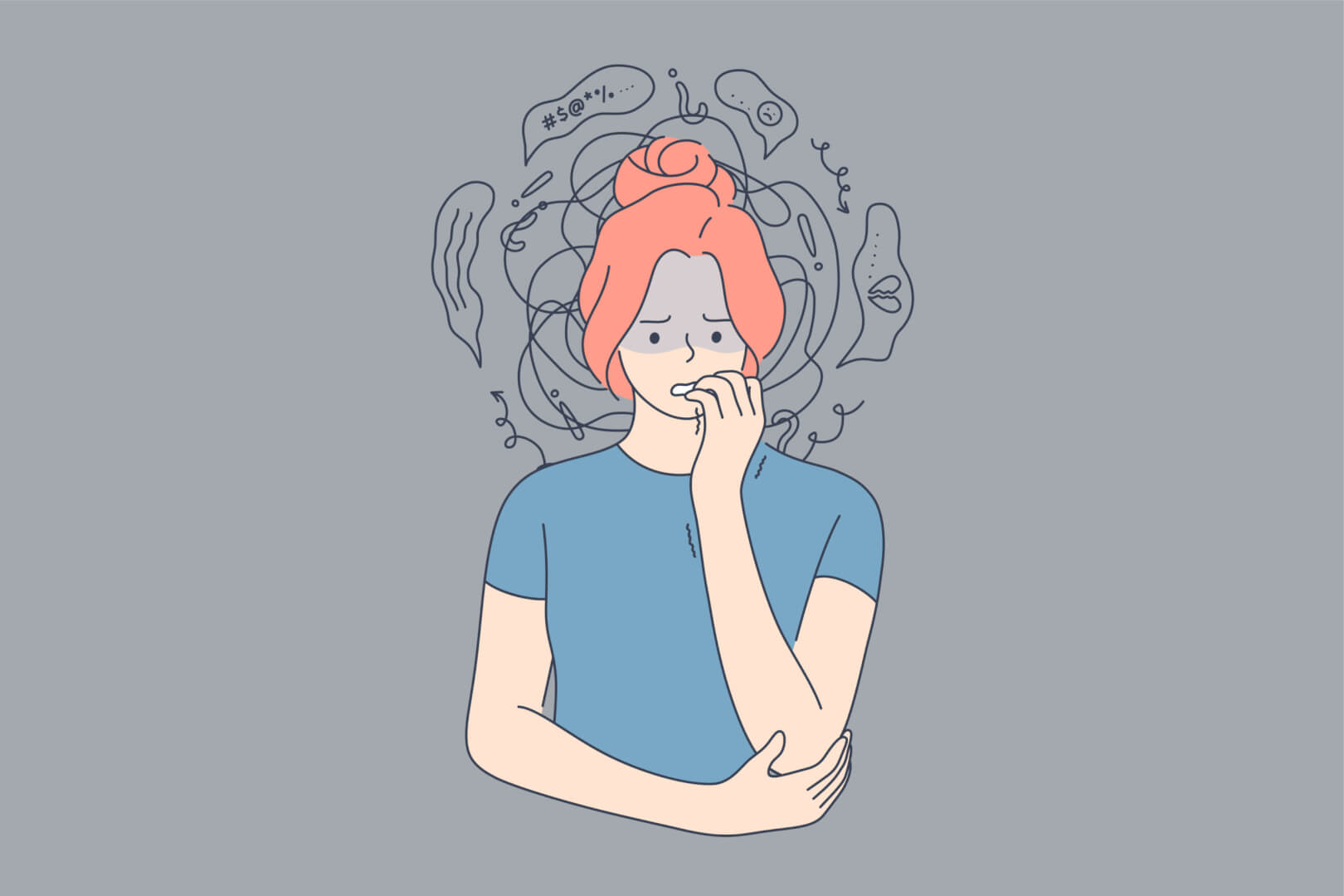People with anxiety disorders often feel like they’re the only ones struggling. They keep their struggle hidden, ashamed to let anyone know that sometimes their thoughts and emotions seem out of their own control.
In reality, anxiety symptoms and anxiety disorders are actually quite common. In fact, one in five people will experience an anxiety disorder at some point in their lives, and everyone experiences anxiety.
If you’re struggling with symptoms of anxiety, it’s important to know that help is available. When mental health issues become too much to handle alone, not everyone knows where or when to see a psychiatrist. Here are 11 benefits of seeing a psychiatrist for fear, stress, and anxiety:
Our psychiatrists offer evidence-based mental health treatments and the latest psychiatric medication options through convenient online visits across California or in-person at our locations in the Los Angeles area. Schedule your appointment today.

1) A Psychiatrist Can Help You Understand Your Anxiety Symptoms
If you’ve never seen a psychiatrist before, it can be hard to understand your anxiety symptoms. A psychiatrist can help you understand your anxiety and how it’s affecting your life.
There are several types of anxiety conditions, all with different types of treatments. To understand them, it’s important to work with a professional who can help you understand the root of your anxiety and how to manage it best.
Some of the most common anxiety conditions include:
- Generalized anxiety disorder (GAD): People with GAD worry excessively about a variety of things, including their health, finances, family, or work.
- Social anxiety disorder: Also known as social phobia, social anxiety is characterized by intense fear and avoidance of social situations.
- Specific phobias: A specific phobia is an irrational fear of a specific object or situation, such as heights, animals, or flying.
- Panic disorder: People with panic disorder experience sudden and unexpected attacks of terror. These panic attacks may also include physical symptoms, such as chest pain, heart palpitations, shortness of breath, sweating, and dizziness.
2) A Psychiatrist Can Help You Identify Your Triggers
Anxiety conditions can be triggered by a variety of things. A psychiatrist can help you identify your triggers and figure out how to avoid them or deal with them in a healthy way.
Common triggers for anxiety conditions include:
- Stressful life events such as divorce, death of a loved one, job loss, or financial problems
- Traumatic experiences such as car accidents, natural disasters, abuse, or combat
- Certain medical conditions such as thyroid problems, heart disease, diabetes, or respiratory disorders
- Substance abuse, alcohol or drug abuse including addictions, dependencies, alcoholism, and withdrawal
3) Determine the Root Cause of Your Anxiety
The process of uncovering the cause of anxiety is usually achieved through talk therapy or psychotherapy. Talk therapy is a type of mental health treatment that focuses on helping you understand and manage your emotions in a healthy way. To get to the root (or roots) of your issue, you and a therapist or other mental health provider may talk about things like:
- Your early childhood experiences
- Any traumas or stressful life events you’ve experienced
- Your current thought patterns and behaviors
- Your relationships
- Your goals for treatment
4) Develop a Treatment Plan That Works for You
Once the root cause of your anxiety has been determined, a psychiatrist can help you develop a treatment plan to address your anxiety and any other mental health conditions you may be experiencing. The most common treatment for anxiety disorders is cognitive-behavioral therapy (CBT), which is a type of therapy used for anxiety that helps you change the way you think and behave.
Other common methods for treating anxiety disorders include:
Medications for Anxiety
Antidepressants, anti-anxiety medications, benzodiazepines, and beta-blockers are all medications for anxiety that can help reduce symptoms of anxiety. With medication management, psychiatrists can help you find the right medication and the right dose quickly so that you can feel better faster.
Relaxation Techniques
Deep breathing exercises, meditation, or yoga can help you relax and manage your anxiety.
Exposure Therapy
This type of therapy helps you face your fears head-on so you can learn to manage them in a healthy way.
5) Learn and Develop Healthy Coping Skills
Throughout the course of your treatment, you’ll learn healthy coping skills that can help you manage your anxiety in a healthy way. Some of the most common coping skills used to treat anxiety disorders include progressive muscle relaxation, meditation, deep breathing exercises, yoga, exercise, journaling, and mindfulness.
A psychiatrist can also help you learn how to identify and reframe intrusive thoughts, cope with difficult emotions in the moment, and manage stress in a healthy way.
6) Address Any Underlying Medical Conditions
If you have an anxiety condition, it’s important to address any underlying medical conditions that may be contributing to your symptoms. Oftentimes, anxiety disorders coincide with co-occurring mental health issues like bipolar disorder, ADHD, PTSD, or substance abuse issues like addiction and alcoholism. A psychiatrist can help you identify any underlying medical conditions and develop a treatment plan to address them.
Additionally, there may be physical health conditions contributing to your anxiety symptoms. Some of the most common underlying medical conditions that can contribute to mental health issues include thyroid problems, heart disease, diabetes, respiratory disorders, and certain types of cancers.
7) Get Support From Loved Ones
If you have an anxiety condition or a mental health issue of any kind, it’s important to get support from loved ones. Your psychiatrist will likely encourage you to reach out to those you trust as part of the healing process. Your family and friends can provide you with the love and support you need to manage your anxiety in a healthy way.
They can also help you be compliant with your mental health care and provide you with positive reinforcement when you’re doing well. It’s important to remember that your loved ones are not responsible for your mental health, but their support can be invaluable.
8) Improve Your Relationships With Others
This one goes with the previous benefit. When you get help for your mental health disorders, you’ll likely find that your relationships with others improve. This is because the skills you learn in therapy can help you communicate better, manage conflict in a healthy way, and set boundaries.
All of these things are essential for maintaining healthy personal and professional relationships. When you have an anxiety condition, it can be difficult to maintain healthy relationships. But with treatment, you can learn how to manage your anxiety in a way that works for you and improve your relationships with those around you.
9) Increase Your Self-Awareness and Self-Worth
When you have anxiety, it’s easy to feel like you’re not good enough. This is because anxiety can distort your perception of yourself and make you believe things that aren’t true.
Fortunately, therapy can help you increase your self-awareness and learn to love and accept yourself for who you are. This can be a difficult process, but it’s worth it. When you have a healthy relationship with yourself, you’ll find that your anxiety is much easier to manage.
10) Find Hope and Meaning in Your Life
When you’re struggling with an anxiety disorder, it can be easy to feel like there’s no hope. With treatment, you can regain control over your thoughts and feel more hopeful.
Your provider will help you find hope and meaning in your life so you can see that there’s a reason to keep going, even when things are tough. This is an important part of recovery from an anxiety disorder.
11) Decrease the Likelihood of Relapsing Into Unhealthy Habits
Finally, working with a therapist can help you decrease the likelihood of relapsing into unhealthy habits. This is because you’ll learn how to identify and avoid triggers, manage stress in a healthy way, and cope with difficult emotions.
When you have the tools you need to manage your anxiety, you are less likely to turn to unhealthy coping mechanisms, such as substance abuse or self-harm. This can help you maintain your recovery in the long term and live a healthier, happier life.
Final Thoughts: Psychiatrist for Anxiety Disorders
If you’re struggling with an anxiety disorder, know that you don’t have to go through it alone. Neuro Wellness Spa’s range of anxiety treatments, including talk therapy, medication management, and TMS therapy are all known to be effective in the management of anxiety. All of our services are conveniently in-network with most commercial insurance policies, making access to in-person and online psychiatry care both affordable and accessible for all residents of California. Get started today.

